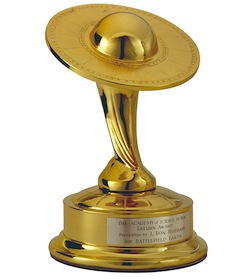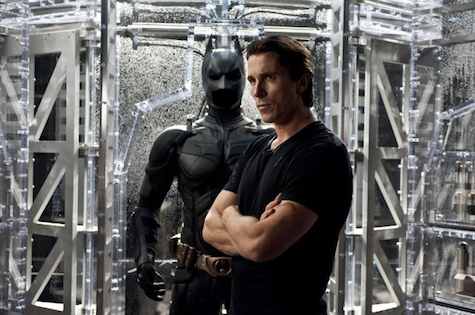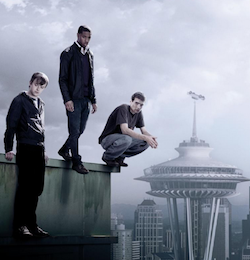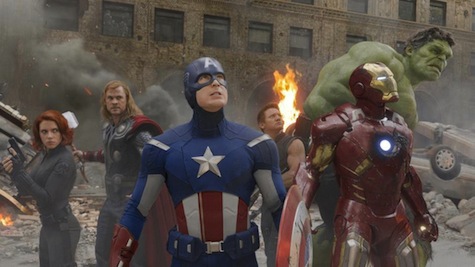On Wednesday of this week, the Academy of Science Fiction, Fantasy, & Horror Films announced their nominees for the 39th annual Saturn Awards. Established in 1972, the awards honor the ways in which genre filmmaking (and TV) have expanded beyond their origins in niche entertainment. It’s no surprise that the list of nominees comes out just days before the Oscars, and though both awards shows share a few contenders, the Saturn Awards highlight those genre films that, though mainstream, still couldn’t nab Oscar attention.

Except, the Academy has a very inconsistent definition of where superhero movies fall within its categories. Does it make sense that The Avengers is nominated for Best Science Fiction Film, The Amazing Spider-Man for Fantasy, and The Dark Knight Rises for Action/Adventure? With 2012 boasting the highest volume and arguably the highest quality of superhero films we’ve seen in years, it becomes painfully clear that the Academy really should consider adding a Superhero category.
You can read the entire list of nominees on the Saturn Awards site, but here are the full lists for the three categories I’m talking about:
Best Science Fiction Film
The Avengers
Chronicle
Cloud Atlas
The Hunger Games
Looper
PrometheusBest Fantasy Film
The Amazing Spider-Man
The Hobbit: An Unexpected Journey
Life of Pi
Ruby Sparks
Snow White and the Huntsman
TedBest Action/Adventure Film
The Bourne Legacy
The Dark Knight Rises
Django Unchained
Les Miserables
Skyfall
Taken 2
Weird, right? Of all the superhero movies listed here, The Avengers seems most logically defined as sci-fi, what with Tony Stark’s Iron Man suit and Loki summoning the Chitauri army to Earth via the Tesseract. But to put Peter Parker’s very science-focused origin story alongside Tolkien, a raunchy teddy bear, and a whimsical romance about a guy’s literary heroine come to life? That makes absolutely no sense.

Oddly enough, Sam Raimi’s Spider-Man was also nominated for Best Fantasy Film a decade ago so apparently the Academy doesn’t hold radioactive spiders in the same esteem as Stark’s armor. Though by that reasoning, shouldn’t Thor and Loki have weighted The Avengers in the direction of Fantasy? (Which is what happened at last year’s awards, with Thor losing Fantasy to Harry Potter and the Deathly Hallows.)
These discrepancies seem to have begun around the time that mainstream superhero movies came back into vogue, which we can credit to Marvel’s gamble on Iron Man in 2008. It seems as if, when confronted each year with more superhero films than the preceding year, the Academy just arbitrarily drops them into various categories. (Like Hancock and Wanted squaring off for Fantasy in 2009 when [3 year old spoilers!] Hancock’s alien plotline clearly makes it sci-fi.) It’s unclear whether this is a move to give the movies a fair shake over various categories, or if it’s borne out of a helpless inability to properly categorize.

This 2009 editorial from Newsarama makes the point that we should really reconsider just how “genre” superhero movies are or aren’t. Sure, they clearly rely on elements of SFF and even horror—but what unites them is not the percentage of scientific accuracy or magic, but the actual people who possess these technology or powers. The rich, poor, bullied, disturbed, charismatic, socially awkward people who were unexpectedly bestowed with the power to set the world right, and don’t always do that.
Consider how Tor.com’s writers have raved about these superheroes in their reviews last year!
Of course we expect Tony to have a bit of a brain crush on Bruce Banner, but the movie takes it to another level by giving the self-obsessed Tony someone he feels the need to prop up and give agency to. The idea that Tony respects both the Jekyll and the Hyde of Bruce’s person and, more importantly, understands the need for Hyde, was a stellar choice within the script. Also, there was genius flirting.
[Peter Parker is] a huge nerd, but in ways that are specific to him. He can fix a freezer, and he’s a burgeoning Maker, but he’s still a kid so although he can understand an equation that his father left behind, he still needs the help of others to piece it into larger theories. And he acts like a nerd acts. He has a strong sense of justice, but a healthy dose of arrogance and a desire to isolate himself from others and live in his own head.
Finally! Christian Bale’s Batman is a person! He has sex! He has desires! He wants to be happy! All of this is punctuated with Alfred’s insistence and anger with him over being reckless with his own life. Carrying over with continuity from the previous film, when Alfred reveals he burned the letter from Rachel, the one that said she had chosen Harvey Dent, the emotional catharsis for Bruce Wayne gets real. He is broken by his feud with Alfred and the revelation that Rachel was not waiting for him before she was killed.
What sets these movies apart is personal, not structural. It does them and their competitors a disservice to try and squeeze them into ill-fitting categories. They should go up against other superhero entries, and nothing else.

We had three blockbusters this year, plus the indie Chronicle. If you had thrown in Ghost Rider: Spirit of Vengeance and Dredd, you would’ve had seven nominees for a Superhero category. That said, the Academy does emphasize that a nominee must be “fine work” and not just mindless entertainment. In that case, you could maybe even make the case for The Bourne Legacy, with all its transhuman themes. No doubt the next few years will see more indie offerings to balance out the big studios’ sequels.
It’s not as if the Academy is rigidly set in its ways when it comes to adding new categories! In this year’s press release, they highlighted the addition of Best Independent Film Release. “We’ve long admired and respected independent filmmakers and their focused visions, which expand ideas and creativity in the genre field,” said Academy President Robert Holguin.
They’ve proven that they’re savvy to new trends and genres. Why they haven’t bitten the bullet and instituted a Superhero category is just baffling. Maybe by the time that The Amazing Spider-Man 2 and The Avengers 2 go head-to-head in 2015—not to mention Star Wars Episode VII, potentially—the criteria will be clearer.
Photos: Saturn Awards, Marvel, Sony Pictures, Warner Bros., Twentieth Century Fox
Natalie Zutter is a playwright, foodie, and the co-creator of Leftovers, a webcomic about food trucks in the zombie apocalypse. Her writing has appeared on Ology, Crushable, and BlackBook, where she discusses celebrity culture alongside internet memes (or vice versa). Weekly you can find her calling in to the Hunger Games Fireside Chat podcast, reviewing new releases at Movie Mezzanine, and on Twitter.











It’s true, these movies should be going head to head, instead they are being put into categories where a) they don’t belong and b) they won’t win(IMO, in each there is a movie in each category that’s “better” but mostly in the sense in that it fits better).
I loved The Avengers, but sorry Hunger Games is better sci-fi, I’ve heard Spiderman’s ok, but Life of Pi, c’mon. TDKR has the best chance of winning its category, but I haven’t seen Skyfall yet to judge, but I honestly think Django will get it.
@Aeryl – Right? They’re just so disjointed! That’s why I thought maybe the Saturn folks were trying to spread the superhero movies out across better categories, but you’re right–they’ll lose in most of them. At least if you put them all in one category, one of them wins.
And yes, I don’t think there’s any way you can compare The Dark Knight Rises and Django Unchained unless it was Best Director.
Sorry for the much belated necro, but this article actually reminds me of something that stuck out in my head.
Ever since Japanese animation started having their own conventions and companies started bringing titles to the US that weren’t SF or Fantasy, SF fandom (and it’s affiliated conventions) have kind of kicked anime to the curb. This stuck out in my mind in particular after watching some old episodes of “Prisoners of Gravity”, which discuss the release of the Akira film, as well as the first English language release of the manga (by Marvel, under their now defunct Epic Illustrated line).
In the past decade+, there have been some excellent works of speculative fiction coming out of Japan, whether in film – like the late Satoshi Kon’s last film, Paprika, on television – like the semi-unfortunately titled Bodacious Space Pirates from last season, to direct-to-video works, like Makoto Shikai’s magnificent Voices of a Distant Star. Unfortunately, in part due to the fact that anime fandom and SF fandom appear to not be cross-pollenating anymore, most anime fans I meet at conventions don’t read SF novels (though some do), and none of the fans I meet at SF conventions watch anime or read manga. Heck, when I was listening to an episode of the SF Squeecast while going to Orycon last year, I was pleasently surprised when, during their live panel, the hosts got asked a question about anime and what shows they were watching, if any, and there were positive responses from Paul Cornell and Seanan McGuire. I forget if Elizabeth Bear or any of the other panelists were watching anything.
I guess my point comes down to this – there are some significant works of science fiction which were made in Japan, and were made as an animated film or TV show, or as a manga, which have not been recognized for any major awards in SF outside of their home country. Further, awards for lifetime achivement from, like, for example, the Damon Knight Memorial Grand Master award, have not historically been awarded posthumously. This means creators like Osamu Tezuka, who have a body of work which clearly demonstrates their worthiness for the award, can never win it because they passed away before they could pop up on the radar of the people who normally choose these awards. Speaking frankly, it is my profound wish that important creators of Japanese speculative fiction, both prose and in graphic media like Anime and Manga (like Leiji Masumoto*, or Yoshiyuki Tomino**), have a chance at their place in the sun, at least in the form of a nomination, before they pass away.
Hayao Miyazaki’s nomination for Best Dramatic Presentation Long Form for Spirited Away was a step in the right direction, but to date it has been the only step in that direction.
*Creator of Space Battleship Yamato/Star Blazers, Captain Harlock, Galaxy Express 999, and other works
**Primarily known as the creator of Mobile Suit Gundam, and the director of various series in its “Universal Century” timeline.